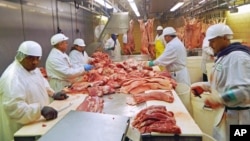After weeks of delays, lapsed deadlines and rumbling from U.S. meat producers, U.S. President Barack Obama on Thursday announced he was cutting the fat out of a major trade agreement with South Africa -- and gave the nation 60 days’ notice that he would revoke duty-free status for agricultural goods such as pork, chicken and beef.
The U.S. government has accused South Africa of being unwilling to play by the rules of the African Growth and Opportunities Act.
That move restricts South Africa’s rights under the trade agreement an accord that allows 39 African nations to export goods to the United States duty-free. The act was renewed in June for another 10 years.
Millions in products
South Africa will still be able to send other products to the U.S. But agricultural goods are a big slice of the pie -- in 2014 the nation used AGOA to export $176 million worth of agricultural products to the United States.
In a strongly worded letter, Obama said he was taking this step "because South Africa continues to impose several longstanding barriers to U.S. trade.”
The move follows months of lobbying by U.S. trade groups, who said South Africa has been reluctant to allow market access to U.S. products like pork, beef and chicken, while opening the market for those goods to other countries.
But South African trade and industry spokesman Sidwell Medupe said South African officials were not perturbed by the president’s strong words. He said the two nations are close to an agreement.
“What is important for us as a country, as South Africa, we are optimistic and we are positive that an agreement, we are close to an agreement as the South Africa and the U.S., to reach an agreement," Medupe said.
"Because most of the things have actually been met. South Africa, from our side, from our side we have achieved and we have met most of the things that are of concern," he added.
Technical concern
One concern remains, and it is highly technical, Medupe said.
South African veterinarians are concerned about outbreaks of avian flu among U.S. chickens and would like to broker an agreement that would keep South Africa from having to import affected poultry.
South Africa has long restricted pork imports because of porcine reproductive and respiratory syndrome -- though there is no proof that the disease can be transmitted from imported meat to domestic pigs.
But that has not stopped this war over pork from turning into a political pigskin. The nation’s official opposition Democratic Alliance is demanding an explanation in parliament on the suspension notice.
"This is frankly nothing short of a disaster," said Geordin Hill-Lewis, the party’s trade spokesman.
"It threatens the livelihoods and jobs of tens of thousands of farm workers on farms across South Africa. ... So the fact of the matter is it should never have been allowed to come to this. We have known for many months that the U.S. government has been unsatisfied with the pace of the negotiations and the South African team has missed many deadlines," Hill-Lewis said.
'Completely unacceptable'
"And that is completely unacceptable. AGOA is very important to the South African economy. We cannot afford to play a game of high-stakes poker with the lives of so many South African workers," he added.
But Medupe noted that the United States needs South Africa as much as South Africa needs the United States -- in effect, escalating the war of words.
“We are of the view that AGOA has contributed significantly toward building the mutual beneficial partnership between the U.S. and South Africa. And we are saying, South Africa is also a vital part of the regional integration and development process underway in Africa. And removing South Africa from AGOA, whose suspension would diminish the significance of AGOA to sub Saharan Africa and the United States," he said.
Medupe said officials from both countries are meeting to try to broker an agreement before the January 1 deadline.




